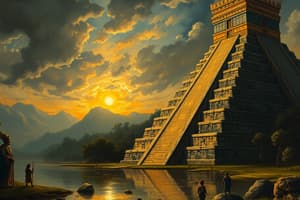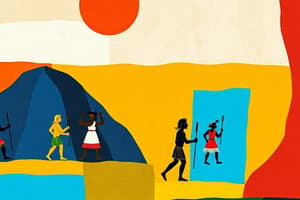Podcast
Questions and Answers
What type of surgery was performed by the Inca that involved making a hole in the skull?
What type of surgery was performed by the Inca that involved making a hole in the skull?
- Craniotomy
- Phrenotomy
- Trepanation (correct)
- Lobotomy
Which natural antiseptics were utilized by the Inca to reduce infection after surgeries?
Which natural antiseptics were utilized by the Inca to reduce infection after surgeries?
- Balsam and saponins (correct)
- Garlic and honey
- Wine and vinegar
- Salt and sugar
During which season in Ancient Egypt was no farming done due to flooding?
During which season in Ancient Egypt was no farming done due to flooding?
- Shemu
- Kemet
- Peret
- Akhet (correct)
What was the purpose of the shaduf in Ancient Egypt?
What was the purpose of the shaduf in Ancient Egypt?
Which types of doctors did the Inca have, specifically known for treating broken limbs and abscesses?
Which types of doctors did the Inca have, specifically known for treating broken limbs and abscesses?
What was a major sign of the Inca's skill in surgery based on their knowledge?
What was a major sign of the Inca's skill in surgery based on their knowledge?
Which tool was used in Ancient Egypt for the process of harvesting crops?
Which tool was used in Ancient Egypt for the process of harvesting crops?
What type of system did the ancient Egyptians use for their numerical representation?
What type of system did the ancient Egyptians use for their numerical representation?
Which substance did the Incas use for pain relief during medical procedures?
Which substance did the Incas use for pain relief during medical procedures?
What was a significant invention by the ancient Egyptians that improved agriculture?
What was a significant invention by the ancient Egyptians that improved agriculture?
Which component was used by the Egyptians to create black ink?
Which component was used by the Egyptians to create black ink?
In ancient Filipino society, who were the lowest social class in the hierarchy?
In ancient Filipino society, who were the lowest social class in the hierarchy?
What medical advancement did ancient Egyptians make that is documented?
What medical advancement did ancient Egyptians make that is documented?
How did the ancient Tagalog counting system differentiate between higher sets of numbers?
How did the ancient Tagalog counting system differentiate between higher sets of numbers?
What was one of the key uses of papyrus for the ancient Egyptians?
What was one of the key uses of papyrus for the ancient Egyptians?
What was the primary medium of exchange in pre-colonial Philippine society?
What was the primary medium of exchange in pre-colonial Philippine society?
What unique garment did ancient Filipina women wear for the lower part of their attire?
What unique garment did ancient Filipina women wear for the lower part of their attire?
Which disease was NOT mentioned as being present in ancient Egyptian mummies?
Which disease was NOT mentioned as being present in ancient Egyptian mummies?
What system did the Spaniards introduce to the Philippines that altered land grants?
What system did the Spaniards introduce to the Philippines that altered land grants?
What was a major consequence of the encomienderos' abuse of power?
What was a major consequence of the encomienderos' abuse of power?
What did the Agrarian Reform recognize regarding land ownership in the Philippines?
What did the Agrarian Reform recognize regarding land ownership in the Philippines?
What was the Royal Decree of 1894 (Maura Law) known for?
What was the Royal Decree of 1894 (Maura Law) known for?
Which problem was predominantly observed during the colonial government's imposition?
Which problem was predominantly observed during the colonial government's imposition?
What was the effect of the Royal Decrees on Filipino peasants?
What was the effect of the Royal Decrees on Filipino peasants?
Who was Fr. Francisco Ignacio Alcina?
Who was Fr. Francisco Ignacio Alcina?
What did the colonial government introduce to agriculture in the native communities?
What did the colonial government introduce to agriculture in the native communities?
What led to many Filipino peasants becoming mere tenants?
What led to many Filipino peasants becoming mere tenants?
How did landowners take advantage of the peasants during this period?
How did landowners take advantage of the peasants during this period?
What was opotherapy in the context of traditional indigenous healing arts?
What was opotherapy in the context of traditional indigenous healing arts?
Flashcards
Trepanation
Trepanation
A process of removing a section of the skull, often used for treating head injuries.
Sancoyoc
Sancoyoc
A type of Inca surgeon who specialized in setting bones, treating abscesses, and removing teeth.
Incan Medicine
Incan Medicine
The Inca used medicinal plants such as coca leaves, wild tobacco, chicha, and maize beer for various medical purposes.
Hieroglyphic Numbers
Hieroglyphic Numbers
Signup and view all the flashcards
Shaduf
Shaduf
Signup and view all the flashcards
Akhet (Inundation)
Akhet (Inundation)
Signup and view all the flashcards
Peret (Growing Season)
Peret (Growing Season)
Signup and view all the flashcards
Shemu (Harvesting Season)
Shemu (Harvesting Season)
Signup and view all the flashcards
Farming Tools
Farming Tools
Signup and view all the flashcards
Ancient Egyptian Medicine
Ancient Egyptian Medicine
Signup and view all the flashcards
Ox-drawn Plow
Ox-drawn Plow
Signup and view all the flashcards
Sickle
Sickle
Signup and view all the flashcards
Irrigation System
Irrigation System
Signup and view all the flashcards
Ancient Egyptian Surgery
Ancient Egyptian Surgery
Signup and view all the flashcards
Wigs
Wigs
Signup and view all the flashcards
Cosmetic Makeup (kohl)
Cosmetic Makeup (kohl)
Signup and view all the flashcards
Toothpaste
Toothpaste
Signup and view all the flashcards
Papyrus
Papyrus
Signup and view all the flashcards
Mummification
Mummification
Signup and view all the flashcards
Repatiamentos
Repatiamentos
Signup and view all the flashcards
Pueblo Agriculture
Pueblo Agriculture
Signup and view all the flashcards
Royal Decrees
Royal Decrees
Signup and view all the flashcards
Maura Law
Maura Law
Signup and view all the flashcards
Ignorance of Legal Processes
Ignorance of Legal Processes
Signup and view all the flashcards
Agrarian Conflicts
Agrarian Conflicts
Signup and view all the flashcards
Exploitation of Peasant Ignorance
Exploitation of Peasant Ignorance
Signup and view all the flashcards
Loss of Land Ownership
Loss of Land Ownership
Signup and view all the flashcards
Herbal Therapy
Herbal Therapy
Signup and view all the flashcards
Fr. Francisco Ignacio Alcina
Fr. Francisco Ignacio Alcina
Signup and view all the flashcards
Study Notes
Inca Civilization
- Inca architecture featured rounded structures with inward-sloping corners and "L"-shaped blocks.
- Inca medicine utilized coca leaves, wild tobacco, chicha, and maize beer for pain relief and anesthesia.
- Natural antiseptics like balsam and saponins were employed.
- Inca surgeons performed trepanation (skull drilling).
- Early trepanation surgeries often proved fatal due to lack of healing bone.
- Inca surgeons demonstrated knowledge of cranial anatomy, avoiding likely problematic areas.
- Post-surgery, natural antiseptics and maize beer were used for pain management.
- Three types of doctors existed: sancoyoc (surgeon-priest) specializing in treating broken limbs, abscesses, and teeth extractions.
Ancient Egyptian Civilization
-
Seasons:
-
Akhet (June-September): Flooding season; no farming.
-
Peret (October-February): Growing season; rich soil from floods.
-
Shemu (March-May): Harvesting season; crops are gathered.
-
Farming Tools:
-
Winnowing scoops, hoes, rakes, flint-bladed sickles, and ploughs.
-
Shaduf: A water-lifting machine.
-
Medicine: Egyptians utilized natural remedies (herbs) alongside prayer.
-
Spirits, in the Doctor's view, blocked body channels affecting health.
-
Numbers: A decimal system using seven symbols:
-
1: Stroke
-
10: Cattle hobble
-
100: Coil of rope
-
1,000: Lotus plant
-
10,000: Finger
-
100,000: Tadpole/frog
-
1,000,000: God with raised arms
Ancient Egyptian Inventions
- Ox-drawn Plough: Revolutionized agriculture (still used in developing countries).
- Sickle: Tool for harvesting grains.
- Irrigation: Canals and ditches to harness Nile floods.
- Shadoof: Water-lifting device.
- Surgical Instruments: 48 surgical cases described, including methods for wound suturing.
- Wigs: Used for hygiene and pest prevention (lice) during hot summers.
- Cosmetic Makeup: Kohl (soot and galena) for eye makeup.
- Toothpaste: Ingredients included ox hooves, ashes, eggshells, and pumice.
- Papyrus: Used for building materials (ships) and paper.
- Mummification: Allowed detailed analysis of diseases (arthritis, tuberculosis, gout, tooth decay, bladder/gallstones, bilharziasis).
- Black Ink: Produced from beeswax, soot, and vegetable gum.
Development of Science and Technology in the Philippines
-
Traditional Filipino attire distinguished by social class - e.g., putong headgear, kangan jackets for chiefs, and bahag (loincloth) for men. Women wore baro/camisa and saya/patadyong.
-
Filipino numerals:
-
Unique counting system using prefixes (e.g., maikatlong for 21).
-
Labí used for numbers exceeding 10 to 20 also used for higher numbers (100, 1000).
-
Philippine Writing System: Limited artifacts compared to other Southeast Asian nations.
Agrarian Reform in the Philippines
- Pre-Spanish Era: Filipino villages (barangays) were led by datus with varying social classes (nobility, freemen, serfs, slaves).
- Spanish Era: Introduced encomienda system (Royal Land Grants) resulting in abuse of power, and tribute as land rents, converting farmers to tenants.
- Agrarian Reform: Recognized all lands as public domain, regardless of local customs or previous Spanish acquisitions.
- Land Disputes: Spanish policies (e.g., Royal Decree of 1894) led to land dispossession. Many Filipino peasants lost their land titles.
- Additional strategies of dispossessing peasants: Landowners took advantage of peasant ignorance of Spanish legal processes.
- Colonial Government's Impact: Introduced pueblo agriculture but it caused agrarian-related issues.
Herbal Medicine in the Philippines
- Herbal Medicine (Opotherapy) was the prevailing form of traditional healing.
- Fr. Francisco Ignacio Alcina, a Spanish historian and Jesuit missionary, documented Filipino herbal remedies in a 1668 manuscript including specific plants and herbs used for medicinal purposes.
Studying That Suits You
Use AI to generate personalized quizzes and flashcards to suit your learning preferences.




